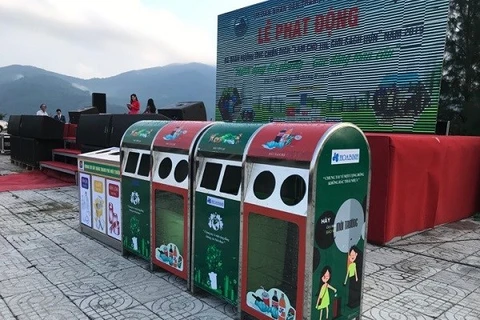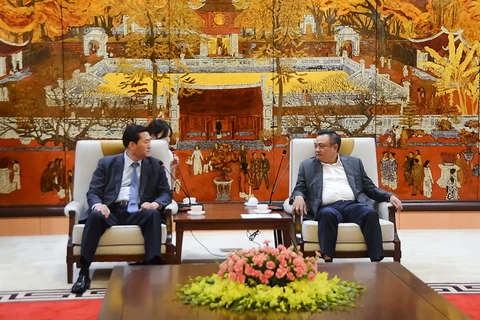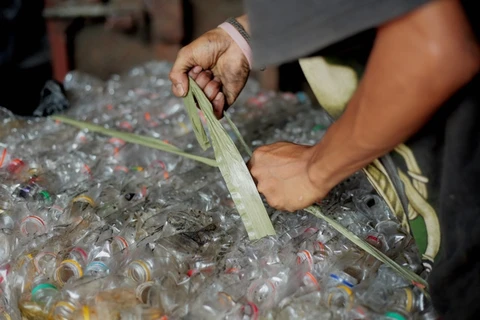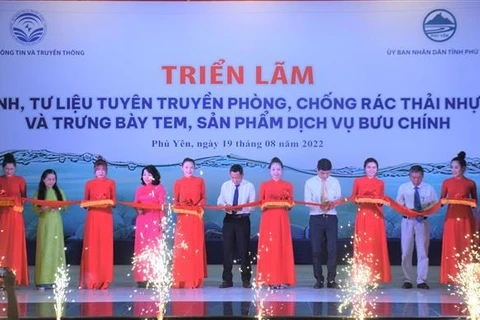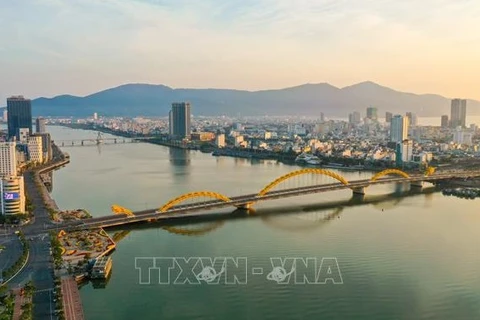Da Nang (VNA) – An international conference and an exhibition are underway in the central city of Da Nang with a focus on waste treatment and environmental technology and solutions towards sustainable urban development in Vietnam.
The events on August 25 and 26 are held by the Da Nang Department of Natural Resources and Environment in coordination with the Vietnam Urban and Industrial Zone Environment Association, the Vietnam Environmental Industry Association, and the Vietnam Waste Recycling Association.
The conference sees the participation of 20 speakers who are policymakers, managers, scientists, and representatives of businesses operating in the environmental sector.
In particular, international speakers delivered many notable speeches on environmental issues such as waste management solutions in Japan (by Adachi Ichiro, an environmental management specialist from the Japan International Cooperation Agency - JICA), highly efficient waste-to-energy solutions from Finland (by Valmet Matti Riitto from the BMH Technology company), the cooperation in urban solid waste treatment between the Association of Southeast Asian Nations (ASEAN) and the Republic of Korea (by Kwan-young Kim from the Korean Ministry of Science and Information and Communication Technologies).
Meanwhile, the international exhibition features 35 booths covering over 1,000 square metres where modern equipment and technologies for urban waste collection, transportation, and treatment are showcased by many domestic and foreign businesses.
A number of activities are also taking place on the sidelines of these events, including a display of environment-themed paintings by children, a waste-for-gift festival, and a workshop for connecting supply and demand and granting investment certificates to enterprises.
Le Quang Nam, Vice Chairman of the Da Nang People’s Committee, said this is the first time his city has hosted such significant events, expected to help Da Nang access advanced and environmentally friendly solutions and technologies for solid waste treatment, thus promoting a model of circular economy, green growth, and sustainable development.
He added this is also a chance for the city to attract investment from the private and foreign sectors to the sorting, collection, and treatment of solid waste to help carry out a plan on building Da Nang into an eco-friendly city.
 Visitors to the exhibition on waste treatment and environmental technology and solutions in Da Nang (Photo: VNA) Nguyen Hung Thinh, Deputy General Director of the Vietnam Environment Administration under the Ministry of Natural Resources and Environment, said managing solid waste is a complicated issue as it relates to many fields and many localities.
Visitors to the exhibition on waste treatment and environmental technology and solutions in Da Nang (Photo: VNA) Nguyen Hung Thinh, Deputy General Director of the Vietnam Environment Administration under the Ministry of Natural Resources and Environment, said managing solid waste is a complicated issue as it relates to many fields and many localities.
Therefore, it is necessary to have all-round solutions from management models and waste treatment technologies in order to control and thoroughly deal with environmental pollution, he noted.
Thinh expressed his belief that the conference and exhibition will help managers, scientists, investors, and technology companies to meet each other to work out advanced and modern solutions appropriate to each locality’s conditions. Experience will also be shared to help with the enforcement of the 2020 Law on Environmental Protection, and with the formation of new waste management methods and behaviours, thereby contributing to a circular economy in Vietnam.
Over the recent past, the population growth and socio-economic development have led to a surge in the goods consumption and, subsequently, the solid waste volume. The amount of solid waste released from daily activities increases by 10 - 16% each year.
The main disposal method at present is burying wastes at landfills, which accounts for 71%. However, only 20% of the existing facilities meet standards while the land reserves for this purpose in localities are shrinking, statistics show.
According to the Ministry of Natural Resources and Environment, the volume of collected solid waste doubled between 2015 and 2019, from 32,400 tonnes to 65,000 tonnes per day, of which 35,600 tonnes or over 50% came from urban areas although the rural population is twice as large as that in urban areas.
In 2019, only 85% of the collected solid waste was treated in ways meeting the national technical standards, up 10% from 2015. The Government aims to increase the rate to 90% for urban waste and 85% for rural waste by 2025, and 100% by 2050./.
The events on August 25 and 26 are held by the Da Nang Department of Natural Resources and Environment in coordination with the Vietnam Urban and Industrial Zone Environment Association, the Vietnam Environmental Industry Association, and the Vietnam Waste Recycling Association.
The conference sees the participation of 20 speakers who are policymakers, managers, scientists, and representatives of businesses operating in the environmental sector.
In particular, international speakers delivered many notable speeches on environmental issues such as waste management solutions in Japan (by Adachi Ichiro, an environmental management specialist from the Japan International Cooperation Agency - JICA), highly efficient waste-to-energy solutions from Finland (by Valmet Matti Riitto from the BMH Technology company), the cooperation in urban solid waste treatment between the Association of Southeast Asian Nations (ASEAN) and the Republic of Korea (by Kwan-young Kim from the Korean Ministry of Science and Information and Communication Technologies).
Meanwhile, the international exhibition features 35 booths covering over 1,000 square metres where modern equipment and technologies for urban waste collection, transportation, and treatment are showcased by many domestic and foreign businesses.
A number of activities are also taking place on the sidelines of these events, including a display of environment-themed paintings by children, a waste-for-gift festival, and a workshop for connecting supply and demand and granting investment certificates to enterprises.
Le Quang Nam, Vice Chairman of the Da Nang People’s Committee, said this is the first time his city has hosted such significant events, expected to help Da Nang access advanced and environmentally friendly solutions and technologies for solid waste treatment, thus promoting a model of circular economy, green growth, and sustainable development.
He added this is also a chance for the city to attract investment from the private and foreign sectors to the sorting, collection, and treatment of solid waste to help carry out a plan on building Da Nang into an eco-friendly city.
 Visitors to the exhibition on waste treatment and environmental technology and solutions in Da Nang (Photo: VNA)
Visitors to the exhibition on waste treatment and environmental technology and solutions in Da Nang (Photo: VNA) Therefore, it is necessary to have all-round solutions from management models and waste treatment technologies in order to control and thoroughly deal with environmental pollution, he noted.
Thinh expressed his belief that the conference and exhibition will help managers, scientists, investors, and technology companies to meet each other to work out advanced and modern solutions appropriate to each locality’s conditions. Experience will also be shared to help with the enforcement of the 2020 Law on Environmental Protection, and with the formation of new waste management methods and behaviours, thereby contributing to a circular economy in Vietnam.
Over the recent past, the population growth and socio-economic development have led to a surge in the goods consumption and, subsequently, the solid waste volume. The amount of solid waste released from daily activities increases by 10 - 16% each year.
The main disposal method at present is burying wastes at landfills, which accounts for 71%. However, only 20% of the existing facilities meet standards while the land reserves for this purpose in localities are shrinking, statistics show.
According to the Ministry of Natural Resources and Environment, the volume of collected solid waste doubled between 2015 and 2019, from 32,400 tonnes to 65,000 tonnes per day, of which 35,600 tonnes or over 50% came from urban areas although the rural population is twice as large as that in urban areas.
In 2019, only 85% of the collected solid waste was treated in ways meeting the national technical standards, up 10% from 2015. The Government aims to increase the rate to 90% for urban waste and 85% for rural waste by 2025, and 100% by 2050./.
VNA

